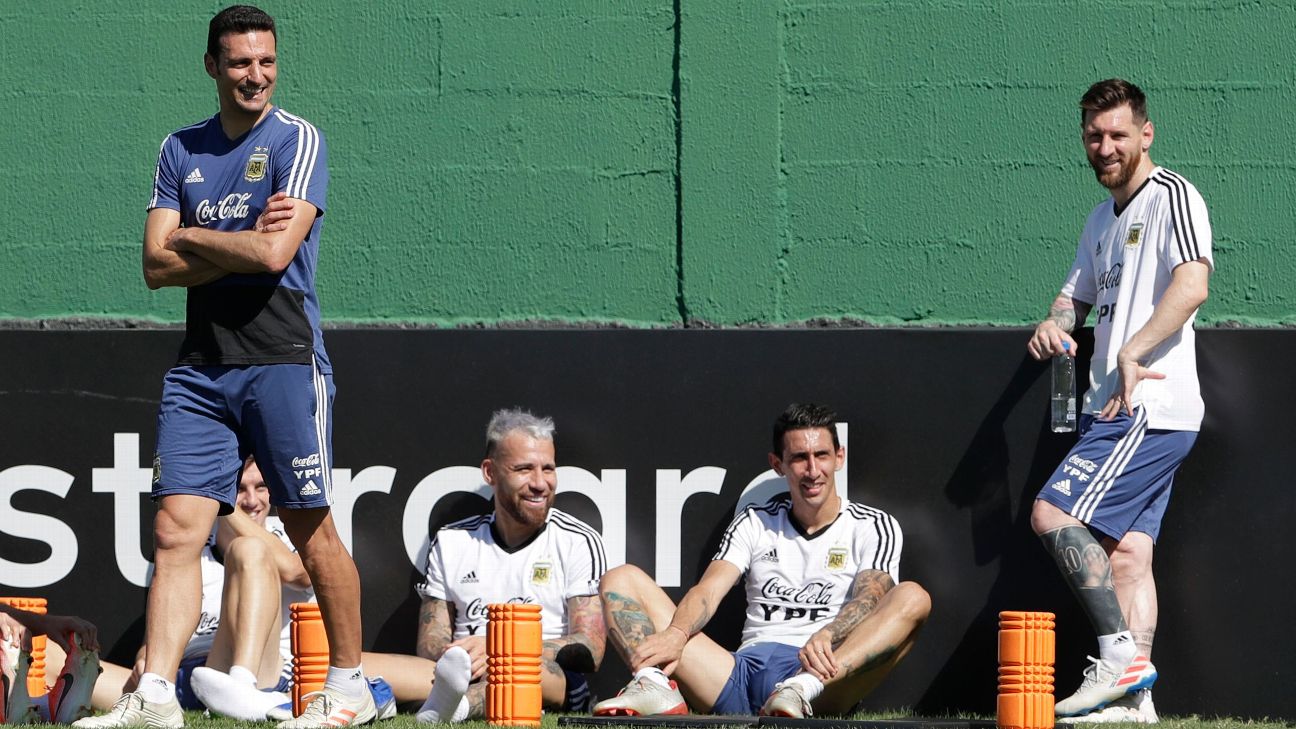
Losing the final of the Copa Centenario to Chile in a shootout in New Jersey three years ago plunged the Argentina national team into a cycle of torment. Coach Gerardo Martino resigned soon afterwards, Lionel Messi flirted briefly with international retirement, the road to Russia 2018 was long and traumatic and, under the highly rated Jorge Sampaoli, once they got there they campaign was predictably poor.
They were patchy in the recent Copa America, and lost in the semifinals — meaning that the wait for a senior title will stretch beyond 26 years. Even so, a sudden serenity has descended — and a large part of that has to do with Messi, even though he is currently suspended and is not in the squad to take on Germany and Ecuador in the next few days.
His long time Argentina teammate Angel Di Maria recently explained why. “It was always said that Messi didn’t sing the national anthem, that he didn’t talk to those around him, but this Copa America was different. I liked the way that he talked to the group and to the press. For the young players this was fundamental. I like this Messi.”
– World Cup 2022 qualifying: All you need to know
The Barcelona star has never been a natural communicator. Indeed, his suspension is because of unwisely harsh words he uttered about corruption in the Copa — like a striker’s tackle, he launched into it with much more enthusiasm than technique. But it seems clear that Messi has arrived at a decision. He could easily have turned his back on the national team. Instead, he seems determined that he will use the time he has left to be the leader, having bought into the collective project.
And this has obviously strengthened the position of the coach. Lionel Scaloni was an entirely inexperienced stopgap, a caretaker figure to take charge after Sampaoli was sacked and before a better name was found. His principal virtue was that he came cheap. But with the result of the Copa deemed satisfactory, and, especially with Messi on board, Scaloni has been given the job on a permanent basis.
And his status is looking all the more permanent after last month’s 4-0 win over Mexico in San Antonio. A few days earlier Argentina had played out a dull goalless draw with Chile, while Mexico had thrashed the United States. San Antonio was set up for an El Tri party, with a full strength Mexico sent out to toy with a rookie Argentina lineup. It looked as the game might follow such a script for 15 minutes, but in the next 25 Argentina scored four times and the contest was over.
It was not just the result that strengthened the hand of Scaloni, it was also the players who made it possible. Pride of place goes to centre forward Lautaro Martinez, who opened his Champions League account for Inter Milan in similarly impressive style away to Barcelona last week. He took advantage of some “Keystone Cop” defending from Mexico to help himself to a superb hat trick and is shaping up nicely to be the long-term successor to Sergio Aguero and Gonzalo Higuain.
Just as important is a generation of young midfielders. River Plate’s Exequiel Palacios was immense against the Mexicans. Alexis MacAllister, currently of Boca Juniors, is another of promise, as is the Bologna bound Nico Dominguez of Velez Sarsfield. All of them were born in 1998 and could have long careers with the national team.
But this still leaves some huge structural problems. It has been some time since Argentina boasted a world-class goalkeeper, with seven having been tried out since the World Cup. The picture is somewhat confused over the next few days because the two leading candidates have not been called up. Franco Armani of River Plate and Esteban Andrada of Boca Juniors have been rested because their teams meet in the decisive second leg of the Copa Libertadores semi-final on Oct. 22.
The defensive positions also remain a headache. The lack of pace has been a long concern, as glaring in the recent Copa America as it was in last year’s World Cup. The senior centre-back remains Nico Otamendi, who has struggled in the Premier League with Manchester City. Juan Foyth of Tottenham and Borussia Dortmund’s Leo Balerdi offer promise, but have plenty to do to show that they can provide the long-term solution.
It will interesting to see how these weaknesses stand up against Argentina’s next opponents. Germany, of course, are old foes, ending Argentina’s World Cup campaign in 2006, 2010 and 2014. In Dortmund on Wednesday they will surely look to take the initiative, and they are unlikely to collapse as Mexico did last month. It looks like a high risk game. And then, in the Spanish town of Elche, come Ecuador — rebuilding through a bad phase. However, they still have the pace and power on the counter-attack that has caused Argentina problems in the past, most notably in the 2-0 win in Buenos Aires during the last World Cup qualification campaign.
If Argentina emerge from these games with their current serenity intact, it will be a sure sign of success.
